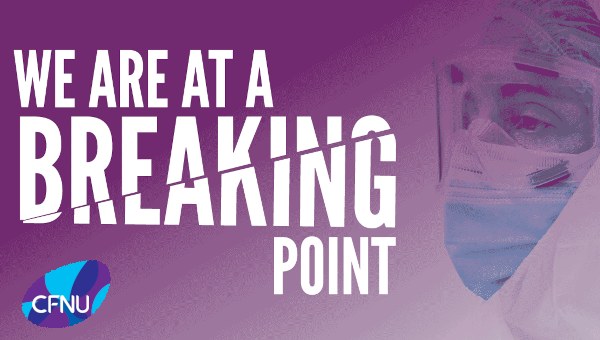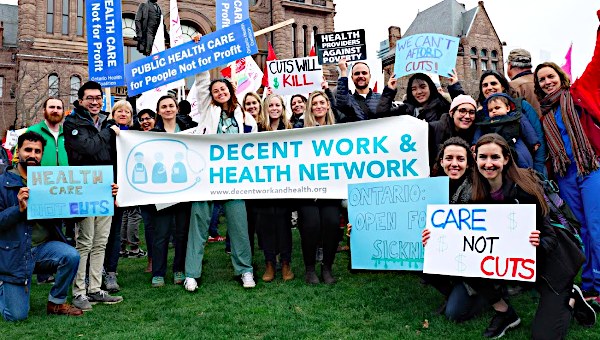Nurses Rising Up To Demand Action to Fix Health Worker Crisis
As the Council of the Federation meets this week in Winnipeg on the future of Canada’s public healthcare systems, nurses are looking to the premiers for coordinated action to fix the crisis in nursing and complete the recovery of our ailing healthcare systems.
“Patients waiting in cars because ERs are full; surgeries delayed; 12-hour shifts that become 16 hours or 24 hours because there’s no relief in sight – these are the painful realities of a severely understaffed healthcare system that nurses and their patients are facing,” said Linda Silas, President of the Canadian Federation of Nurses Unions (CFNU). “As Premiers discuss healthcare agreements, it is crucial they center the voices of frontline nurses.”
Nurses from across the country shared what it’s currently like working in healthcare. Their stories are showcased in a new CFNU campaign that brings nurses’ experiences to the forefront of the health crisis conversation.

Complete the Recovery
“Nurses have told us how deeply concerned with patient care they are, and burn out is rampant across the profession,” said Silas. “We need comprehensive retention initiatives, immediate and long-term, to stop the mass exodus of healthcare workers and ensure nurses are there when we need them.”
Silas emphasized the importance of investing in nurses within Canada’s public healthcare system to stem the reliance on costly for-profit staffing agencies. The CFNU is calling on premiers to use the recent increase to the Canada Health Transfer and the negotiation of bilateral agreements to bolster the nursing workforce by investing in strong retention initiatives, enabling a robust recovery of public healthcare systems across the country.
Canada’s nurses are proposing investments in key areas to address the dire crisis:
- Adopting minimum nurse-to-patient ratios
- Enacting legislation and regulations around safe hours of continuous work
- Strengthening mental health supports
- Supporting nurses across their careers through initiatives such as paid preceptorship and flexible scheduling
- Expediting registration and workforce integration for internationally educated nurses
“The impact short-staffing has on nurses and patients cannot be overstated. Nurses are doing everything in their power to care for patients, but much of the power to improve patient care lies with governments,” explained Silas. “We are urging provinces and territories to work with nurses’ unions and push for federal government support on innovative pan-Canadian programs to directly support frontline nurses. This is a critical moment in healthcare, and Canada’s leaders must be ready to roll up their sleeves and rise to the occasion.”
“To protect patient safety, we need to better retain nurses, which means making workloads for frontline nurses manageable. We can start to do this by bringing in minimum nurse-to-patient ratios,” explained Silas. “Health systems with ratios in place, like California, see improved outcomes for patients and higher job satisfaction. B.C. has now agreed to implement nurse-patient ratios – it’s time every province followed suit.”
“But we are never going to keep nurses from leaving the profession until we also address the unsustainable hours nurses are having to work,” concluded Silas. “We have rules around the hours truck drivers and pilots can be forced to work, but nurses have no such safeguards. With all due respect to other professions, aren’t nurses responsible for the most precious cargo of all? Nurses need work-life balance.” •





